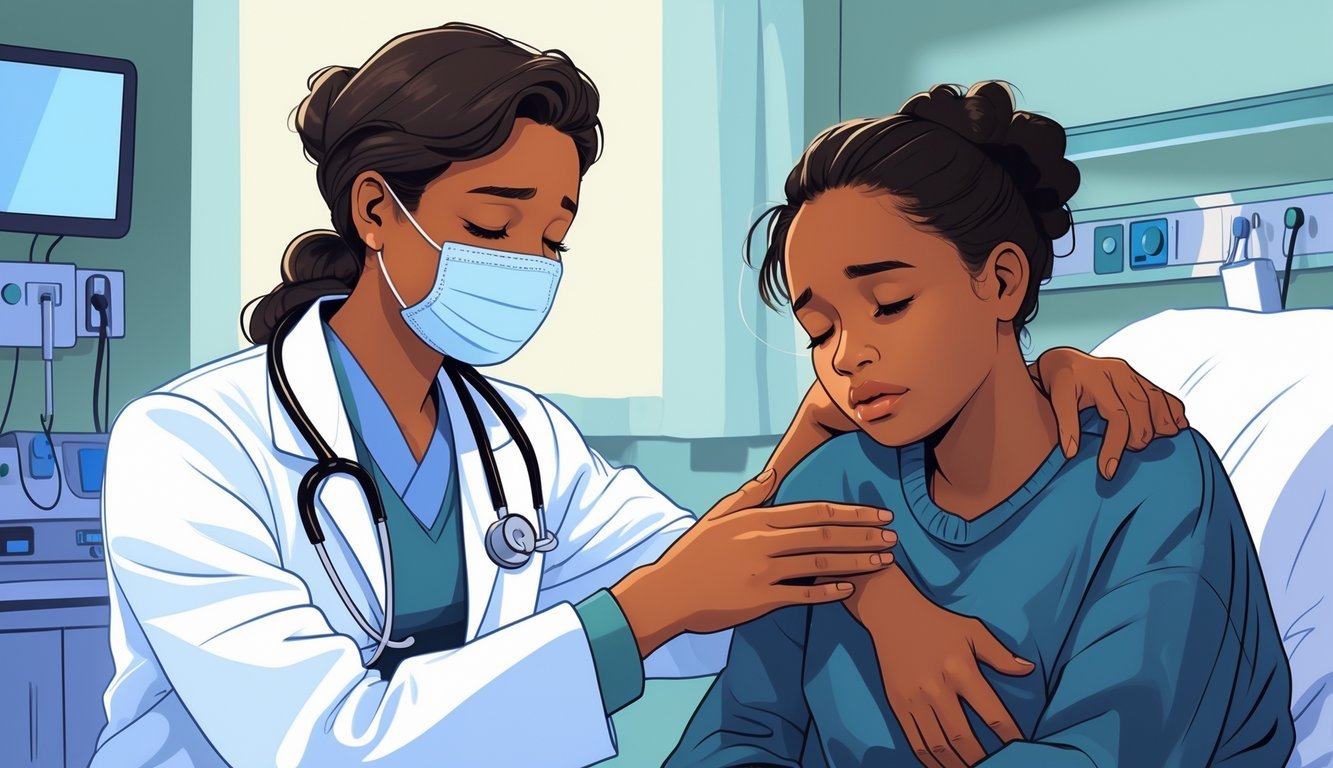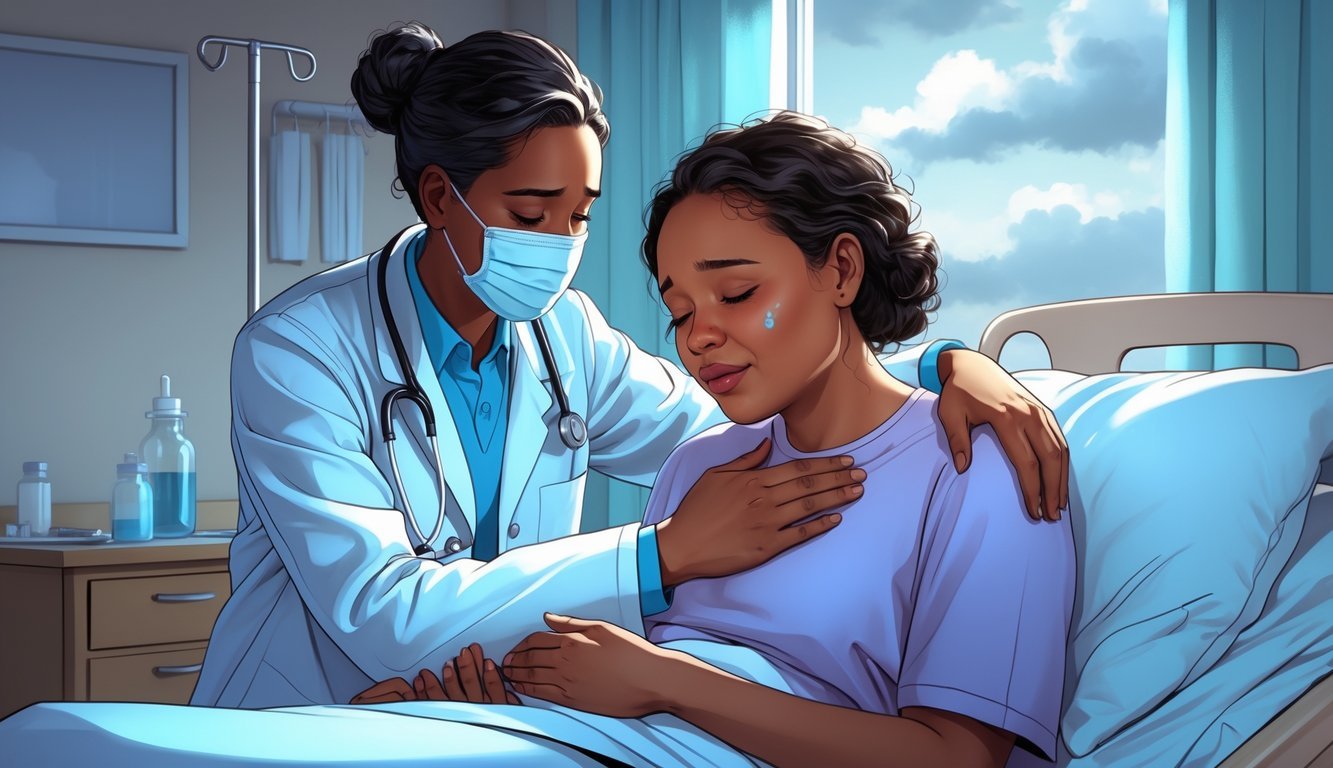PsychNewsDaily Publishers
100 Summit Drive
Burlington, MA, 01803
Telephone: (320) 349-2484
PsychNewsDaily Publishers
100 Summit Drive
Burlington, MA, 01803
Telephone: (320) 349-2484
Grief during the coronavirus pandemic feels heavier and more complex, requiring sincere, simple expressions of sympathy to provide comfort and connection to those mourning.

Losing someone during the coronavirus pandemic just hits differently. Grief feels heavier and more complicated. You might feel isolated, or maybe you’re not sure how to comfort anyone when everything’s so distant now.
Doctors’ words can really bring comfort and hope when you can’t be there in person.
How you express sympathy now? It matters more than ever. Simple, honest messages from healthcare workers can make people feel seen—even if it’s through a mask or a screen.
Knowing the right thing to say, or even just when to say it, can help others cope with loss. Sometimes, it’s less about the words and more about the timing and sincerity.
You don’t need fancy language to show you care. Little acts of kindness, honest feelings, and sharing memories can warm someone’s heart during a tough time.

Losing someone is always tough. During a pandemic, it can feel impossible. Comforting words help ease the pain a bit.
They remind you that you’re not alone. Others care about what you’re going through, even if it’s from afar.
When you lose someone, grief affects both your mind and your body. The pandemic makes things worse because the usual ways of saying goodbye might not be possible.
You might feel more isolated or confused about your emotions. There’s often extra stress, like worrying about illness or the future.
This mix of feelings can make it hard to find peace. Hearing kind words can help you feel less alone in your pain.
Doctors often become the first people to reach out after a loss. Their words guide you through those first, raw moments.
When doctors offer sympathy, they show they understand your pain and respect your feelings. During the pandemic, they know your grief might be more complicated.
They use simple, honest phrases like “I’m sorry for your loss” or “We’re here to support you.” This helps you feel cared for, even when hugs and visits aren’t possible.
When someone shows kindness, it builds a little bridge back to the world. That connection can give you strength.
Even a few comforting words remind you that people still care. Simple acts of kindness break up the loneliness that comes with grief.
Whether it’s from family, friends, or healthcare workers, these moments of care create a space where your feelings are okay. This connection helps you move through grief, one step at a time.

You can show care and sympathy in new ways, especially now that face-to-face comfort isn’t always possible. Technology and thoughtful messages help you support those who are grieving, even from a distance.
Social media lets you share condolences quickly with lots of people. You can post a simple message like “I’m so sorry for your loss,” or maybe share a memory of the person who passed.
This public show of support can mean a lot. Private messages work too—a direct note or comment feels personal.
You could even create online memorial pages or groups where friends and family gather to share stories and support each other. Just remember to be sincere and respectful.
Try to avoid clichés or rushing to fix someone’s grief. Sometimes, just letting them know you care is enough.
Virtual funerals have become pretty common. When you join online, try to dress respectfully and minimize distractions, just like you would in person.
You might light a candle or take a quiet moment for the person who passed. During the service, you can use chat features to send sympathy messages.
Afterward, reach out personally to the family with a call or a message, showing you care beyond the event.
If you’re helping organize, make sure the link stays secure so only invited people join. It helps to prepare attendees on how to use the platform, too.
Joining virtual funerals keeps connections alive and shows you value the grieving family.
Helping someone create memories can make grief a little lighter. You could suggest writing letters or gathering photos and stories to celebrate the person’s life.
These keepsakes turn into a lasting legacy. Sharing memories during calls or online gatherings can also bring comfort and strengthen bonds among those mourning.
Supporting legacy projects, like planting a tree or making a donation in the person’s name, turns sadness into something positive. It keeps the memory alive in a meaningful way.

When you write a condolence message as a doctor, it helps to keep things clear, kind, and personal. Simple, honest words let the grieving person feel your support.
Start with a warm expression of sympathy. Acknowledge the pain of their loss.
Offer to listen if they need it. If you knew the person, mention a memory or a fact about them.
Keep your tone calm and caring.
Use gentle phrases like, “I’m so sorry for your sudden loss.” Don’t try to explain the loss or give advice.
Let the person know you’re there to support them anytime.
Say things like, “I’m thinking of you,” or “You’re in my thoughts.” You can add, “I’m here to listen whenever you need.”
If you have a positive memory, share it.
Acknowledge the special bond between a mother and child. You might say, “Your mother’s love will always be with you.”
Offer support gently, like, “I’m here when you want to talk.”
Respect their long life and the memories they left. You could write, “Your loved one lived a full life and touched many.”
Express care for the family’s feelings during this time.
You could say, “My heart goes out to you,” or maybe, “Please accept my deepest sympathy.”
Some people prefer, “Sending you strength,” or even, “Holding you in my thoughts.”
These words let you show you care, without having to repeat the usual phrases.